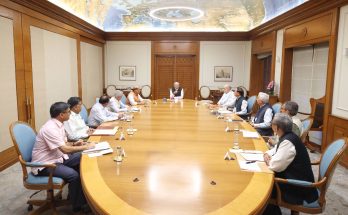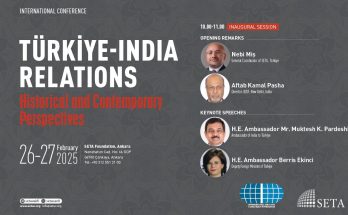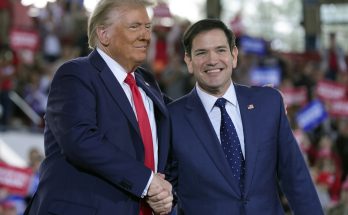 NEW YORK: There was no grand rhetoric and only hints on the way ahead, but the much-anticipated meeting between the leaders of India and Pakistan in New York marked the first tentative steps towards re-engagement and a display of political will by both sides to seek better relations between their countries.
NEW YORK: There was no grand rhetoric and only hints on the way ahead, but the much-anticipated meeting between the leaders of India and Pakistan in New York marked the first tentative steps towards re-engagement and a display of political will by both sides to seek better relations between their countries.
The atmosphere was friendly, but subdued, sans great expectations, at the New York Palace Hotel as Indian Prime Minister Manmohan Singh and his Pakistani counterpart Nawaz Sharif greeted each other and sat down for talks on September 29. The talks took place in same hotel that Sharif and India’s then prime minister Atal Behari Vajpayee met in 1999 to launch the Lahore peace initiative, a hopeful phase in ties that was quickly shattered a few months ago by the conflict in Kargil, masterminded by the Pakistani Army.
The first talks between Manmohan Singh and Sharif were aimed at seeking “a new beginning” in ties strained by a spate of shootings on the border, but it looks like that a revival of the stalled dialogue process will have to be wait for some more time. In a spirit of pragmatism, the two leaders decided to prioritize the restoration of cross-border ceasefire which has been challenged in the past few months through a spike in infiltration and the brutal killing of Indian soldiers along the Line of Control. The only tangible step that emerged from an hour-long interaction was a decision to task the Directors General of Military Operations (DGMO) of both countries to probe the recent ceasefire violations on the Line of Control and institute steps to prevent the recurrence of such incidents.
The two sides expressed a desire to improve ties but agreed that “peace and tranquility across the LOC (Line of Control) is a precondition,” India’s National Security Adviser Shivshankar Menon told reporters in New York. “We need to address the issues that we face today and then we hope to move it forward,” he stressed.
Officials of both countries stressed on the “positives” and voiced hope about their commitment to improving ties, but did not clarify the rules of engagement. India’s National Security Adviser Shivshankar Menon described the talks as ”useful and constructive.” “Both sides wish to see a better India-Pakistan relationship than we have today,” said Menon.
In a separate interaction, Pakistan’s Foreign Secretary Jalil Abbas Jilani called the atmosphere “very positive.” “The most significant aspect of the meeting was that the leaders expressed their commitment to … better relations between the two countries,” was all Jilani would say when asked about outcomes of the talks.
 Unlike many times in the past, when the leaders the two countries chose to indulge in grand rhetoric and even spoke about ushering in a new chapter in bilateral ties, this time the expectations were not high, and this perhaps helped in keeping the interaction more focused and business-like. There was a touch of circumspection as officials of both sides remained vague when asked about the course of the dialogue process in the future. Menon, a former envoy of India to Pakistan, spoke guardedly. The question of
Unlike many times in the past, when the leaders the two countries chose to indulge in grand rhetoric and even spoke about ushering in a new chapter in bilateral ties, this time the expectations were not high, and this perhaps helped in keeping the interaction more focused and business-like. There was a touch of circumspection as officials of both sides remained vague when asked about the course of the dialogue process in the future. Menon, a former envoy of India to Pakistan, spoke guardedly. The question of
“how useful,” was the meeting would be answered, “over the next few weeks, depending on the progress that we make on the immediate concerns,” said Menon. “Both sides have the desire,” he said.
The desire alone will not be enough, as any seasoned observer of India-Pakistan relations know only too well. Between conception and creation, falls the shadow, and that shadow has only lengthened in the past few years with Pakistan repeatedly failing to honour the anti-terror pledge. Sharif, since he swept to power in May, has made positive statements about seeking peace with India and enhancing trade and people-to-people relations.
But as the recent brutal killing of Indian soldiers along the LoC, allegedly at the behest of Pakistan’s Army, indicated that the Pakistani leader’s intentions vis-à-vis India are not shared by the powerful military establishment in Rawalpindi that sets that country’s agenda for India-Pakistan relations.
After the talks, Pakistan’s top diplomat, however, rejected this interpretation when asked whether the Pakistan military was on board the peace initiative with India and stressed that all institutions in Pakistan are “on the same page.” The veracity of this assertion will only be confirmed in months to come by concrete actions by Pakistan in punishing perpetrators of cross-border killings and prosecution of 26/11 architects and killers. Otherwise, the hope for “sustained, uninterrupted and uninterruptible” dialogue will remain a chimera, cutting off millions of people of India and Pakistan from manifold benefits of constructive engagement between the two countries.
(Manish Chand is Editor-in-Chief of India Writes, www.indiawrites.org, an online magazine and journal focused on international affairs.)
Author Profile

- Manish Chand is Founder-CEO and Editor-in-Chief of India Writes Network (www.indiawrites.org) and India and World, a pioneering magazine focused on international affairs. He is CEO/Director of TGII Media Private Limited, an India-based media, publishing, research and consultancy company.
Latest entries
 India and the WorldMay 3, 2025IMEEC provides a democratic alternative to BRI: Italy’s former foreign minister (Interview)
India and the WorldMay 3, 2025IMEEC provides a democratic alternative to BRI: Italy’s former foreign minister (Interview) India and the WorldApril 21, 20253T Template for India-US Mega Partnership
India and the WorldApril 21, 20253T Template for India-US Mega Partnership India and the WorldFebruary 14, 2025Modi-Trump COMPACT: India, US launch MEGA partnership for 21st century
India and the WorldFebruary 14, 2025Modi-Trump COMPACT: India, US launch MEGA partnership for 21st century India and the WorldJanuary 28, 2025Modi, Trump talk global peace, focus on strategic connect
India and the WorldJanuary 28, 2025Modi, Trump talk global peace, focus on strategic connect







